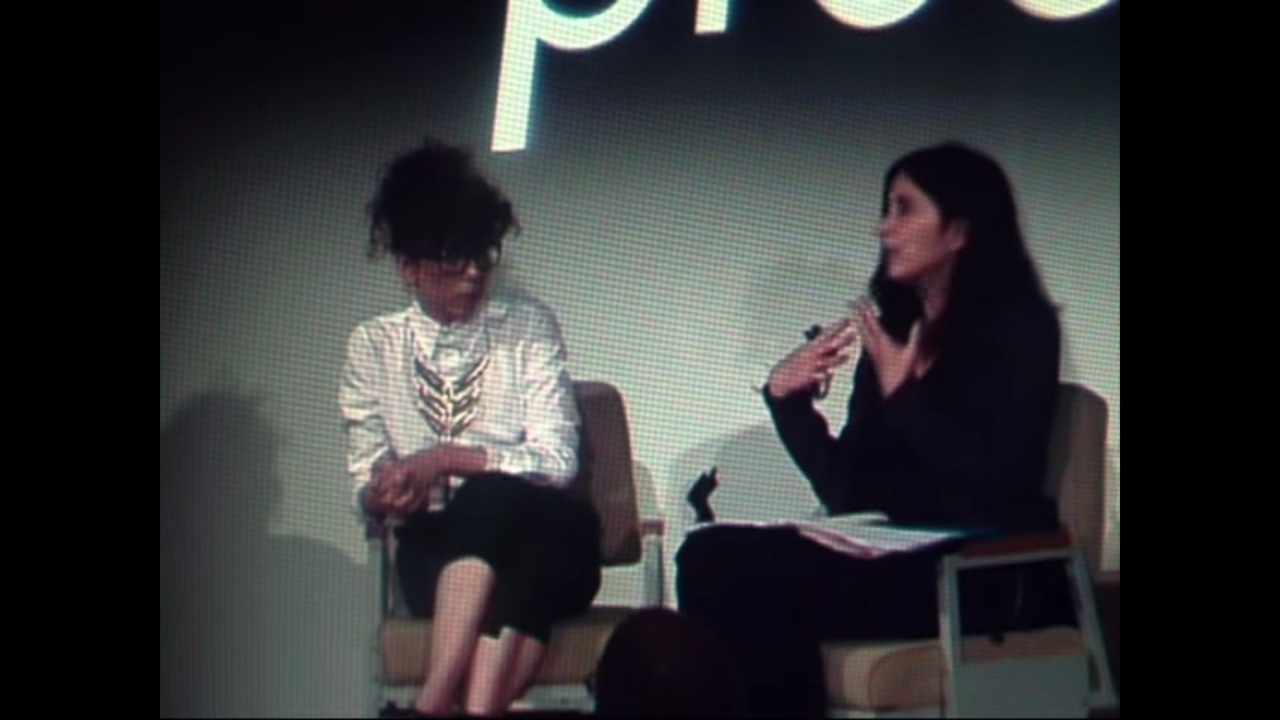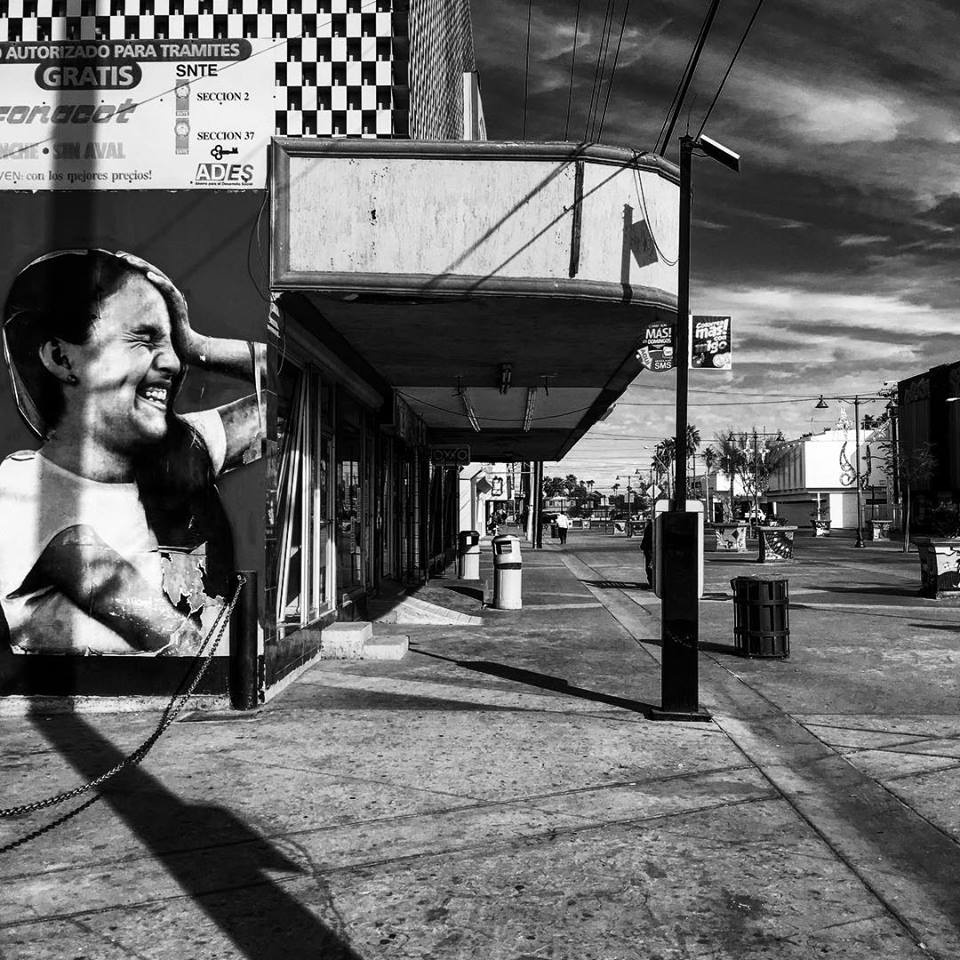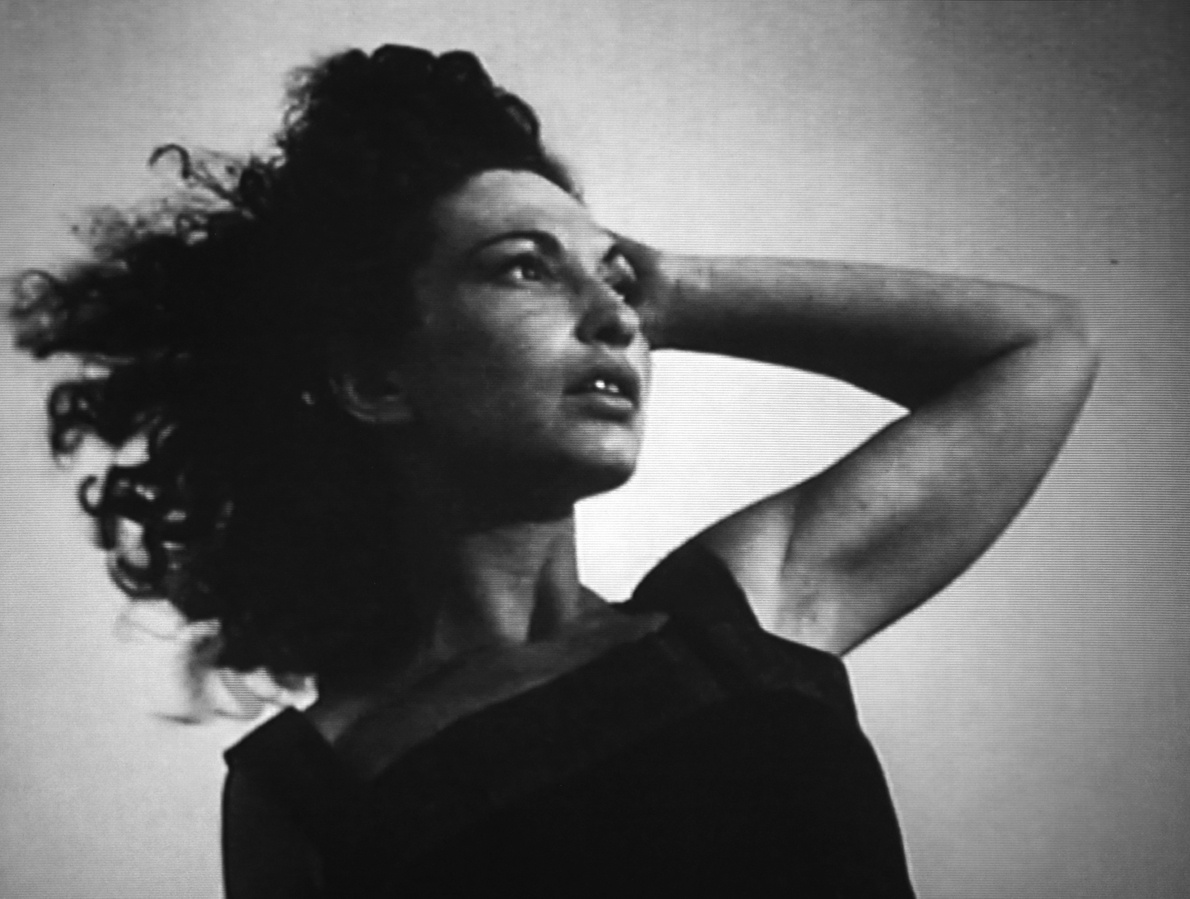The feelings I Fail to capitalize, I fail Chris Kraus and Ariana Reines in conversation on auto-fiction and biography

Chris Kraus und Ariana Reines, Interview bei Miss St.'s Hieroglyphic Suffering, Guggenheim Museum, New York, 2009, Filmstill
ARIANA REINES: When I was first reading you, it was in your bio that you were working on a biography of Kathy Acker, and then it wasn’t in your bio any more. I’m curious about how the idea evolved for you, over time.
CHRIS KRAUS: After Acker’s death in 1997, I felt driven to write about her. Luckily, I did a few interviews then with people she’d been close to in her earlier life. But I’d just published “I Love Dick,” and it all seemed too close. People were seeing my work as some kind of third-gen aspirational Acker, and I didn’t want to encourage that! But then years later, in 2012, I realized that writing about Acker could act as an antidote to the spate of bad memoirs about the glories of NYC in the ’70s and ’80s. To tell the truth about one person can fan out, toward a more truthful history of her era and her contemporaries. In a sense, I’m writing it like a novel: energized by the distance between then and now, me and her. There’s a kind of alchemy, working with sources: these little jolts where I feel I could write “I” as well as “she.” Sure we had a few boyfriends in common, but the real charge comes from realizing we shared many influences. I see all these strands of the twentieth century running through her life and her work.
REINES: In many ways you are the perfect witness for Acker’s life, and for her work’s meaning for so-called literature itself. Your position puts you at the ideal crossroad of nearness and distance, empathy and criticism – the chapter I read on your behalf last year at Artists Space was exhilarating: at once damning and elegiac, like a Proust party scene.
KRAUS: I’m amazed by how absent Acker’s work is from the current discourse about “auto-fiction,” etc. Her early writings are ur-texts for a sensibility that ranges between high and low culture, grounded in personal presence. It’s interesting, always, to look back in history for clues about how things came to be.
REINES: I’ve been thinking about the gentrification of the Internet a lot lately; it’s like New York now, do you know what I mean? Everything is money, all shiny facade and upward mobility, and a very “real estate” mentality wherein you see people marking territory, hammering away at their “message.” On the internet, coherency is money. Consistency is money. Time is of course money. The feelings I fail to capitalize on become the feelings I fail – not only do I fail them inwardly, by not delivering them to some wider truth, to the quote unquote culture, but I fail myself by letting them die inside me, where there is no money to pay them with …
KRAUS: Capitalize on your feelings? Do you mean by writing about them?
REINES: I guess I’m being abstract.
KRAUS: No, no – I have that feeling too. I mean I get asked to write all these more or less expendable pieces constantly, and so I ask myself: Oh, do I want to monetize this feeling? by turning it into a published text?
REINES: Right, I do the same thing.
KRAUS: Sometimes the answer is no. [laughs] Very rarely, but sometimes!
REINES: I’m always amazed by how prolific you are. I’ve published less, and appeared less in public in the last year, than I have for the last nine years. This silence was precipitated by ugly things – workplace sexual harassment, mainly, but other things too. A need to ripen. I have been thinking a lot about silence and the hunger for it, about womanliness and the withholding of language (which is sort of synonymous with the withholding of sex in all the old poems and books, right).
KRAUS: Yes, there’s this pressure to be always -present. Mystery – the unknown and elusive – is not highly valued. You’ve been talking about doing this fascinating project, tracking down the traces of Barbara Mor – a fairly obscure, intermittently homeless scholar and poet whose work took place on the US/Mexican border. It’s kind of a twentieth-century romance – the search for the obscure and missing progenitor, as in Bolaño’s “Savage Detectives”. And Barbara Mor was a poet …
REINES: Totally a poet, of kaleidoscopic erudition, and the co-author, with Monica Sjoo, of “The Great Cosmic Mother: Rediscovering the Religion of the Earth” (1987) – one of the canonical goddess books of second-wave feminism. And she has two very slim volumes of wildly visionary poetry – “The Blue Rental” and “The Victory of Sex and Metal” – I think those are her only publications aside from the goddess book. And she did all of her work – which is ferociously learned and incredibly, alarmingly alive – basically with no support whatsoever. Embodied, viscerally brilliant and sexual, the way David Wojnarowicz’s writing is … and Acker’s, certainly. In fact, I think they may have been at UCSD at the same time. Edgar Garcia, a poet-scholar at the University of Chicago, introduced me to her – actually he was like: You are in kinship with this person. You need to know her.

Pablo Castañeda, „Street Art, Mexicali", 2016
KRAUS: Edgar Garcia discovered Barbara Mor. It’s a familiar thread – one writer discovers another, usually an overlooked older writer, and helps resurrect and bring forward that work. Alice Walker tracked down Zora Neale Hurston’s unmarked grave. Weren’t you spending time in the Southwest when you discovered Barbara Mor’s work? She lived there for part of her life.
REINES: She did a lot of writing at a Burger King in Tucson – Tucson being something of an epicenter of second-wave feminism at the time … and at the very end of her life, I believe she wound up in Oregon. She worked on the goddess book in rural New Mexico while raising two children, had had a friendship with James Dean, a long, bad love affair with a charismatic homeless man … her poetry is full of the landscape and the presence of “lost time” that is the Southwest; it’s also full of languages – Spanish, Ancient Greek, a density of languages passing through a woman’s body, and it’s itinerant … like your writing … driving, time travel, soul travel …
KRAUS: Around this time last year, I picked you up in Tucson. Do you remember? I had to go to Albuquerque and you were in Tucson, and somehow we didn’t look at MapQuest or we misread it, and we thought that those two cities were close.
REINES: Yeah! [laughter]
REINES: I was so amazed! I was like, “Really? Are you sure this is on the way?"
KRAUS: So I drove to Tucson and arrived after your reading when you were in the bar with the students. I was staying in one of those $30-a-night freeway motels, and we met for coffee the next day. We were just going to meet up and say bye. But you just took a look around and realized your duties were done, you may as well leave, so you threw your bag in the car. We drove from Tucson to Albuquerque that day, and then on to Santa Fe. We had that beautiful eight or nine-hour drive …
REINES: It was gorgeous.
KRAUS: North through Arizona and New Mexico, and the desert mountains, and then the thunder over the mountains as it was getting dark. That was a really good time.
REINES: That was beautiful. And I gave you a jean jacket.
KRAUS: From France. I’ve got it still. But I’m wondering – when you write poems, do you consciously go through a gathering period? Or is the material more an accumulation that enters the frame of the poem?
REINES: There’s both kinds. For some poems, the ones that I feel are more bomb-like, that have a lot of explosive energy behind them, there’s a gathering period, and I actually consciously withhold from myself the writing, because I want to build up anxiety and desire, almost like a sexual longing, you know? But then there’s the other kind of poem that I’m writing constantly, you know what I mean? In the notebook just burbling along. Though my sense with you is that you compose really quickly.
KRAUS: But I don’t! Maybe once the gathering’s done. The four novels I’ve published were drawn from lived experiences, and that takes a long time. I don’t think I’ll do that again. But weirdly, writing the Acker biography, I feel like I’ve transferred that process to archival material. Living closely with the materials for enough time that I can internalize them in the same way as my own lived experiences.
REINES: That’s so beautiful. This sense of an alchemy of writing, a witchcraft – wherein experience undergoes some mysterious process inside the body and the soul to become, finally, true style … for Proust the process had to do with time and metaphor: he called it “the varnish of the masters."
KRAUS: Yes, Absolutely … that’s the witchcraft! [laughs]
REINES: But your style is still somehow extremely fast. It has the speed of poetry, and it also has the torque and the worldview of a poet’s sensibility, married to the pleasure of journalistic information; nothing is held preciously or in a labored way. Your writing is always moving, and FAST, like in that New York School of poetry kind of way.
KRAUS: I took a long time to start writing. When I finally did, I thought well, okay, maybe I can’t be a “Great Writer,” but I may have the ability to be accurate. And hopefully, at the same time, amusing – that’s the NY School thing – to convey complicated ideas with some conversational charm. You’ve been talking for a while about writing in a more journalistic, non-fiction vein …
REINES: I kind of want to investigate the boundary between anthropology, visionary poetry, and like gonzo journalism. I’m really, really intrigued by how the motor of anthropology becomes invigorating when you’re an invisible or oppressed entity or quantity, culturally, and how this explosion ends up working both as a motive for research and as a visionary stimulant. There’s this complicated fragmentation in the consciousness that I think has to do with the way a woman is or has so far been forced to speak. She has to be able to speak both from within her experience and as though from outside of herself, and I see this in Maya Deren’s work as a filmmaker and her work as an anthropologist. And in Zora Neale Hurston, her anthropology is so artistic, it’s the anthropology of an artist-practitioner, not of someone positioning herself somehow “outside” of culture, or outside of her own history and experience. It’s the anthropology of a woman, a sassy shit-talker, also an Ivy-league and cosmopolitan hipster, an erudite folklorist from nowhere Florida, who is also an incomparable artist and a seasoned magician … so there’s this great way that hers doesn’t have the prissiness of an official gaze, even though she was trained by Margaret Mead and Franz Boas at Columbia, in the crucible of anthropology.

Maya Deren, „At Land", 1944, Filmstill
KRAUS: For Zora, anthropology offered an upward mobility, a way of more fully becoming herself: owning her culture through a methodological frame. Whereas for Deren, it was more an escape: walking to and then leaping off the edge of the Earth. But what about Barbara Mor?
REINES: One of the stories I’ve heard from Edgar is that after she wrote the Goddess book, which was being taught all over the place … that despite the success of her book, Mor was homeless. And I know a little something about this dynamic …
KRAUS: You know, researching my book, I’ve started to see Kathy Acker more as an artist than as a writer. Would you agree? The difference, to me, is that an artist is defined through an internal process that will eventually result in the creation of certain artifacts. Whereas a book is such a conscious construction that has more a life of its own, beyond the writer’s own process …
REINES: I think I understand you. In a way, what artists are selling are like these iterations of some kind of subject position that they represent. And then they can make a lot of whatever it is that they make – chew toys, or whatever they sell. And so, in some way, it’s like you’re buying some portion of a state of consciousness that they represent.
KRAUS: Exactly.
REINES: For me, each book is a kind of time machine, and it always transforms the substance of my existence. The first person it’s changing is you. And then once it’s moving through the world and being read, this other kind of transformation starts to happen. For instance, I was recently collaborating with Jim Fletcher on performance projects, and then with a sculptor, Oscar Tuazon, on an exhibition called “PUBIC SPACE,” which involved a series of boundary markers, or “herms,” that I’d wanted to make with Oscar for years. Through this, though, I realized I wouldn’t want to be anything but a writer – except for maybe a musician – because there’s nothing more intimate. And there’s something about the kind of intimacy that a person has with the work that you have made, and also the amount of intimacy with yourself that it requires, in order to do it, that is not to be found anywhere else …
KRAUS: I think that’s true.
REINES: I sometimes feel a bit disdainful of artists, because of the way that they sell; the way that they portion out these, like, servings of their consciousness and how it doesn’t demand as much of them as what a writer asks of herself every second.
KRAUS: Right. They only have to have one idea a year and the rest is execution. But a poet or writer has to have an idea every day that they’re writing.
REINES: Yeah, yeah! And in fact, the thing that’s most arousing to me is to have the most ideas in the least amount of space possible. I’m just like, “Bomb me! Do it to me!” How much of a charge can I get, for myself or off of something, you know what I mean? How ecological could I be? That’s what I’m after. And that’s one of the things that’s also so rewarding about reading you. [laughter]
KRAUS: Well, thank you! But really it’s the banal that I’m after. Writing “Kelly Lake Store,” the best moment was talking to the “town historian,” who lived two doors down from the store and explained why it went out of business. When Terz, the first owner, ran it, he let people pump their own gas, and he sold enough groceries to put together a meal. The new owners put in digital pumps and a cappuccino machine, and nobody went. The texture of time is all in the most banal details.
